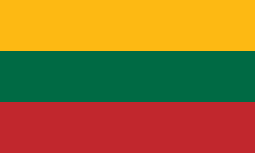Flag of Lithuania
National flag of the Republic of Lithuania
The Flag of Lithuania is a tricolour flag currently used by Lithuania. The flag has three horizontal stripes. The yellow stripe on the top represents the sun, the green stripe in the middle represents forests, the red stripe on the bottom represents the blood of people who defended Lithuania's freedom.[1] The flag's ratio is 3:5 (1:2 in 1989). The Council of Lithuania first adopted it in 1918. When the Soviets occupied Lithuania in 1940, they changed the flag to a Soviet one. When Lithuania gained independence in 1990, the flag was reintroduced. This newly introduced flag had a ratio of 1:2. In 2004, it was changed to 3:5.[2]
 | |
| Use | National flag and civil ensign |
|---|---|
| Proportion | 3:5 |
| Adopted | 1918 (modifications made in July 2004) |
| Design | A horizontal triband of yellow, green and red. |
 Variant flag of Lithuania | |
| Use | State flag |
| Proportion | 3:5 |
| Adopted | 2004, first documented use 1410. |

Special days for the flag
changeThe table below shows the dates when the flag should be flown:
| Date | English Name | Remarks |
|---|---|---|
| January 1 | Flag day | Commemorating the day when the national flag was first raised on the Gediminas Tower in 1919 |
| January 13 | Day of the Freedom Fighters | In memory of the January Events in 1991 |
| February 16 | Day of Re-establishment of the State of Lithuania (from the Russian Empire, 1918) | Hoisted with the Latvian and Estonian flags |
| February 24 | Day of Independence of Estonia | Hoisted with the Latvian and Estonian flags |
| March 11 | Day of Restitution of Independence of Lithuania (from the Soviet Union, 1990) | Hoisted with the Latvian and Estonian flags |
| March 29 | NATO Day | In honor of Lithuania's accession to NATO in 2003; hoisted with the NATO flag |
| May 1 | European Union Day | In honor of Lithuania's accession to the European Union in 2004; hoisted with the EU flag |
| May 9 | Europe Day | Commemorates the end of World War II in 1945; formerly called Victory Day during the Soviet era |
| May 15 | Day of Convening of the Constituent Seimas | In honor of the Constituent Assembly of Lithuania |
| June 14 | Day of Mourning and Hope | Marks the date of the first mass deportations of Lithuanians to Siberia in 1941; the flag is marked for mourning |
| June 15 | Day of Occupation and Genocide | Marks the beginning of Soviet occupation of Lithuania in 1940; the flag is marked for mourning |
| July 6 | Statehood Day | Commemorates coronation of the first king, Mindaugas, in 1253 |
| July 15 | Day of the Battle of Grünwald | Commemorates the Lithuanian and Polish victory over the Teutonic Knights in 1410 |
| August 23 | Day of Black Ribbon | Marks the signing of the Molotov-Ribbentrop Pact in 1939; the flag is marked for mourning |
| August 31 | Day of Freedom | Marking the final departure of the Red Army from Lithuania in 1993 |
| September 23 | Day of Genocide of Lithuanian Jews | Marking the destruction of the Vilnius ghetto by Nazi Germany in 1943 |
| October 25 | Constitution Day | Commemorating the adoption of the national constitution in 1992 |
| November 18 | Day of Latvian Independence | Hoisted together with the Latvian and Estonian flags |
| November 23 | Day of the Lithuanian Soldier | Commemorating the establishment of the Army of Lithuania in 1918 |
References
change- ↑ "Details - The World Factbook". www.cia.gov. Retrieved 2021-03-05.
- ↑ "Lietuvos valstybės vėliava". www.lrs.lt (in Lithuanian). Retrieved 2021-03-05.